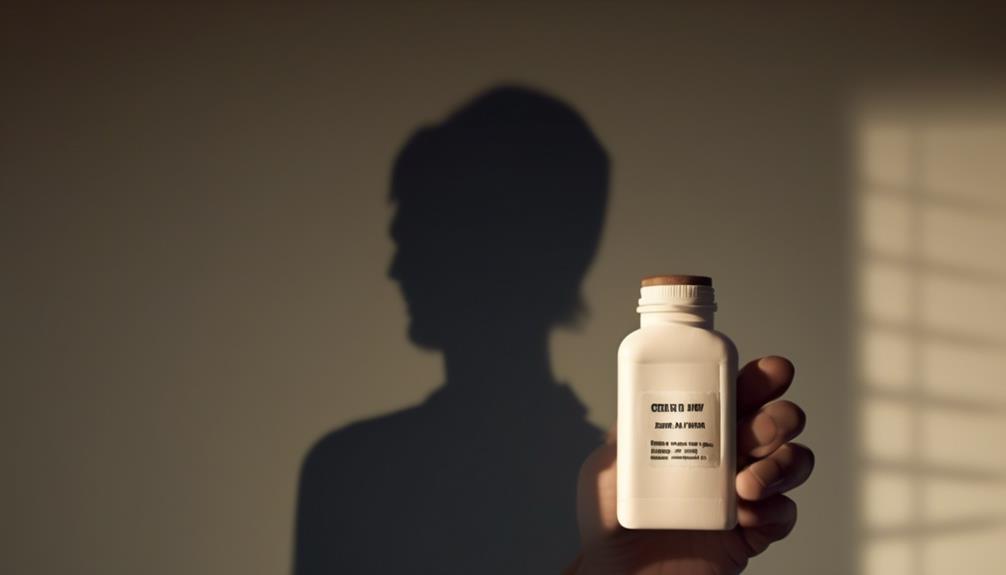When analyzing the intricate connection between covert narcissists and substances, you may come across a web of complexities that go beyond surface-level observations.
The allure of drugs to individuals with covert narcissistic tendencies can reveal intriguing insights into their psyche, shedding light on deeper motivations and behaviors.
As we navigate this nuanced terrain, it becomes evident that the relationship between covert narcissism and drugs is a multifaceted puzzle waiting to be unraveled, promising revelations that may challenge our preconceived notions and spark a deeper understanding of this intricate dynamic.
Key Takeaways
- Covert narcissism can be intertwined with substance use disorders.
- Drug use may serve as a coping mechanism for covert narcissists.
- Manipulative behaviors are closely linked to substance abuse in covert narcissists.
- Relationships with covert narcissists who abuse substances can be toxic.
Understanding Covert Narcissism
Exploring the intricate nature of covert narcissism reveals a complex interplay of subtle control mechanisms and underlying psychological motivations. Covert narcissism, characterized by manipulation tactics and a facade of innocence, can lead individuals to engage in impulsive and abusive behaviors, including drug abuse. Understanding covert narcissism is crucial as it can be intertwined with substance use disorders, perpetuating a cycle of harmful behaviors.
Narcissistic abuse, fueled by feelings of shame and a lack of empathy, can drive individuals to seek solace in drugs or other addictive substances to cope with emotional distress. Covert narcissists may use drugs as a means of control, numbing their insecurities and maintaining a sense of power over others. Furthermore, problematic social media use and other addictive behaviors can also stem from the underlying traits of covert narcissism.
Impact of Drug Use

Substance abuse significantly impacts individuals' physical, mental, and emotional well-being, exacerbating symptoms of narcissistic personality disorder. For covert narcissists, drug use can serve as a coping mechanism to mask insecurities stemming from vulnerable narcissism. This behavior can lead to impaired control over substance use, escalating addiction risks. The temporary sense of grandiosity achieved through drugs or alcohol can provide a fleeting escape from feelings of inadequacy that often plague individuals with narcissistic tendencies.
Studies have shown a strong correlation between narcissistic personality disorder and substance use disorders, particularly alcohol-related problems. The lack of empathy and risk-taking behavior inherent in both narcissism and addiction can further perpetuate the cycle of substance abuse.
Apart from the physical health ramifications like overdose and addiction, drug use can also strain personal relationships, exacerbate mental health issues, and lead to legal troubles, compounding the challenges faced by covert narcissists struggling with substance use.
Manipulative Behaviors and Substance Abuse
The correlation between manipulative behaviors exhibited by covert narcissists, particularly through subtle control and victim-playing, and their tendency towards substance abuse highlights the intricate interplay between psychological manipulation and addiction.
Covert narcissists, with their narcissistic tendencies, often use drugs or alcohol as a means to self-soothe and maintain their grandiose self-image. The mediating role of manipulative behaviors in exacerbating substance abuse is significant in understanding the complex dynamics of narcissism and addiction.
Individuals with narcissistic personality disorders may manipulate others to facilitate their substance abuse, employing charm and deceit to obtain drugs or alcohol. This manipulation can intensify as substance abuse progresses, leading to increased exploitation of those around them.
The link between narcissism and substance use disorders underscores the importance of recognizing and addressing the manipulative behaviors that often accompany addiction. By acknowledging this connection, we can better comprehend the challenges faced by covert narcissists in managing their substance abuse issues within the framework of their manipulative tendencies.
Relationship Dynamics

In understanding relationship dynamics involving covert narcissists, it's crucial to recognize the intricate interplay of manipulative behaviors and self-centered tendencies that shape their interactions with others. Covert narcissists often exhibit abusive behaviors when using drugs, as substances can exacerbate their lack of empathy and further distort their emotional well-being.
The combination of a covert narcissist's traits and substance abuse can lead to a darker manifestation of their already problematic behaviors. Alcohol problems become a significant issue when intertwined with the manipulative tendencies of a covert narcissist, as it can further fuel their sense of superiority and entitlement while diminishing their ability to consider the needs of others.
Feelings of inferiority, common among covert narcissists, may serve as predictors of alcohol-related issues, as they seek to cope with their insecurities through substance use. In relationships, these dynamics create a toxic environment where the covert narcissist's self-serving behaviors are amplified, often at the expense of their partner's well-being.
Mental Health Implications
Examination of the mental health implications associated with covert narcissism and addiction reveals a complex interplay between psychological factors that significantly impact overall well-being. When considering the intersection of mental health, Narcissism, and addiction, it becomes evident that individuals with covert narcissistic traits may be at a higher risk for developing substance abuse issues, including alcohol use disorder. Their fluctuating self-esteem and challenges with problem recognition can contribute to a cycle of addiction that is difficult to break without intervention from a mental health professional. Below is a table summarizing key points regarding the mental health implications of covert narcissism and addiction:
| Mental Health Implications | Description |
|---|---|
| Narcissism and Addiction | Strong link between narcissism and various forms of addiction, requiring professional intervention. |
| Role of Addiction in Narcissism | Narcissists may use addiction to self-soothe, maintain a false self, and avoid confronting unpleasant emotions. |
| Seeking Help for Narcissistic Addiction | Essential for managing addiction in individuals with narcissistic traits to address underlying issues for long-term recovery. |
| Impact on Relationships | Addiction in narcissists leads to seeking more narcissistic supply, resulting in relationship deterioration. |
Frequently Asked Questions
What Hurts a Covert Narcissist the Most?
Criticism challenges a covert narcissist's fragile self-esteem and superiority. Dismissing their accomplishments wounds their need for validation. Being overlooked hits their ego hard. Rejection triggers abandonment fears. Exposing manipulative behavior damages their caring image. Ignoring them hurts because they seek attention. Betrayal shatters their sense of importance. Loss of control distresses them. Challenges to authority undermine their exceptionalism.
These factors deeply affect a covert narcissist's emotional well-being and self-image.
What Upsets Covert Narcissist?
Criticism, rejection, and feeling inferior can deeply upset a covert narcissist, challenging their perceived superiority. When ignored or lacking admiration, they may react strongly due to entitlement. Exposed manipulative behaviors or not being in control can trigger intense reactions.
Their need for validation and admiration can cause distress if unmet. Perceiving others receiving more recognition may also provoke negative emotions.
In essence, various threats to their self-image and control can upset covert narcissists significantly.
What Are the Red Flags of a Covert Narcissist?
When identifying red flags of a covert narcissist, observe for behaviors like lack of empathy, manipulation, control, and constant need for admiration. These individuals may exhibit entitlement, exploit others, lack self-esteem, and struggle with criticism.
Understanding these signs can help navigate relationships with covert narcissists and protect oneself from potential harm. Recognizing these patterns early on can aid in setting boundaries and maintaining emotional well-being.
How Does a Covert Narcissist Act When Confronted?
When we confront a covert narcissist, they often resort to defensive tactics like deflecting blame, gaslighting, or playing the victim. Their goal is to avoid taking responsibility for their actions and maintain control over the situation.
By manipulating emotions and invalidating our concerns, they try to protect their self-image. It's crucial to stay vigilant and not let their tactics undermine our self-worth or truth.
Conclusion
In conclusion, the relationship between covert narcissists and drugs is like a tangled web of deception and self-destruction.
Just as a spider weaves its intricate web to trap its prey, narcissists use substances to mask their insecurities and manipulate those around them.
However, like the delicate strands of a spider's web, this facade of superiority is fragile and easily broken, ultimately leading to further harm and chaos in their lives.









